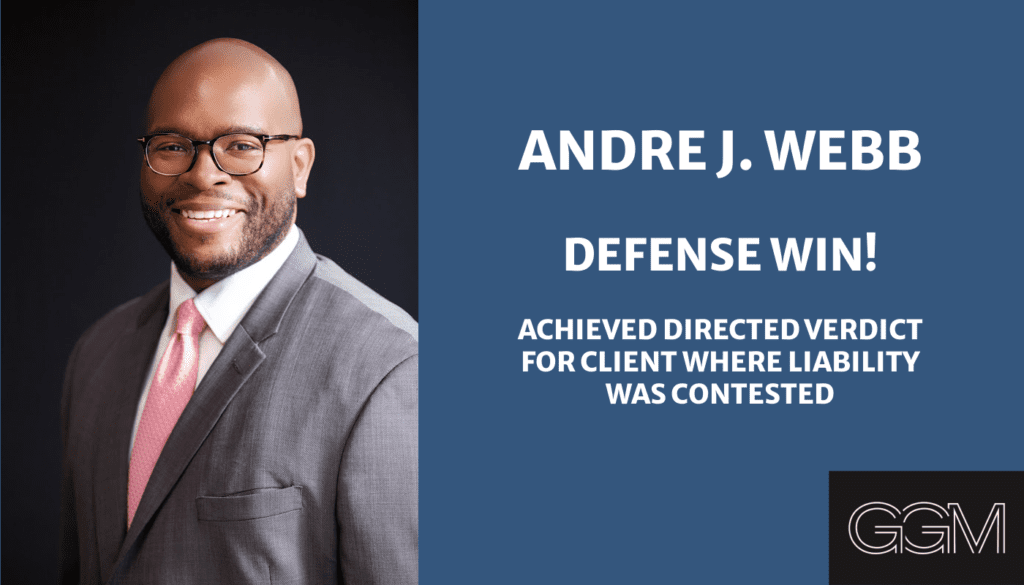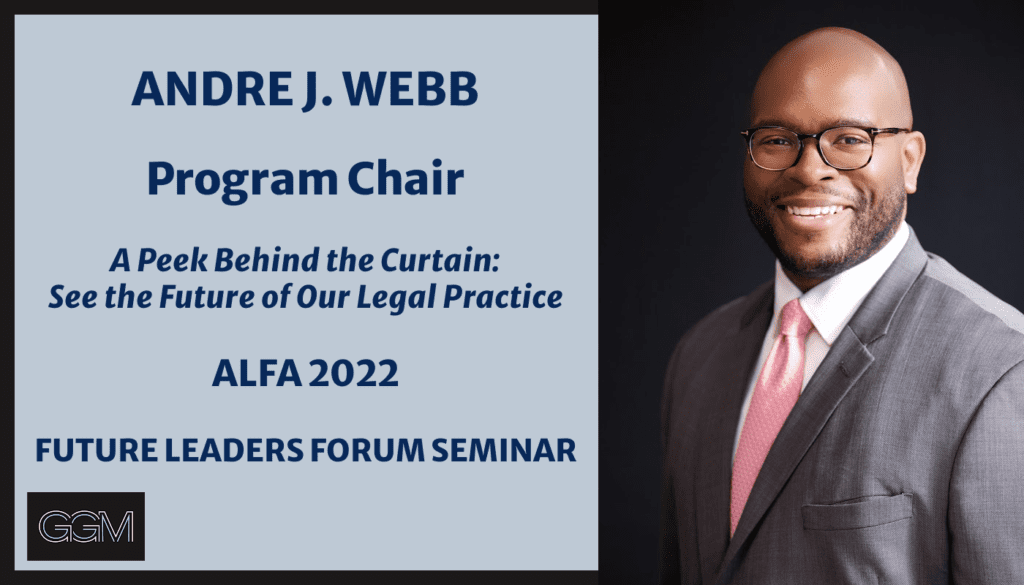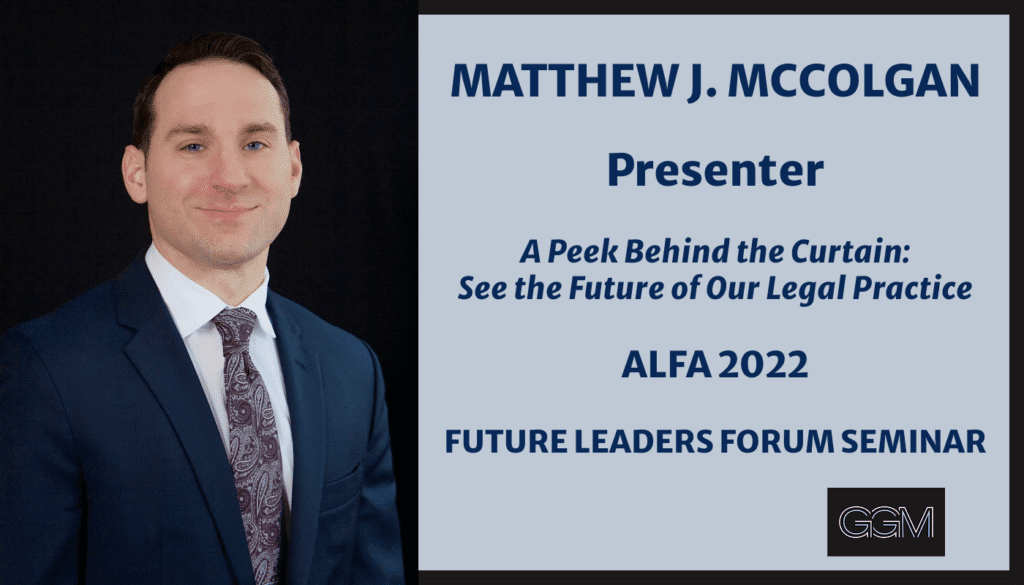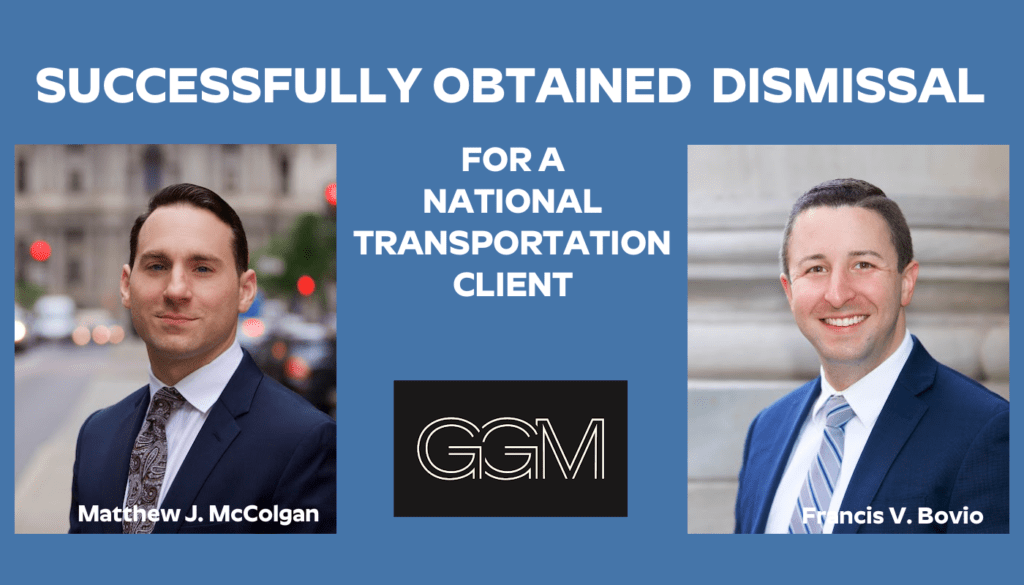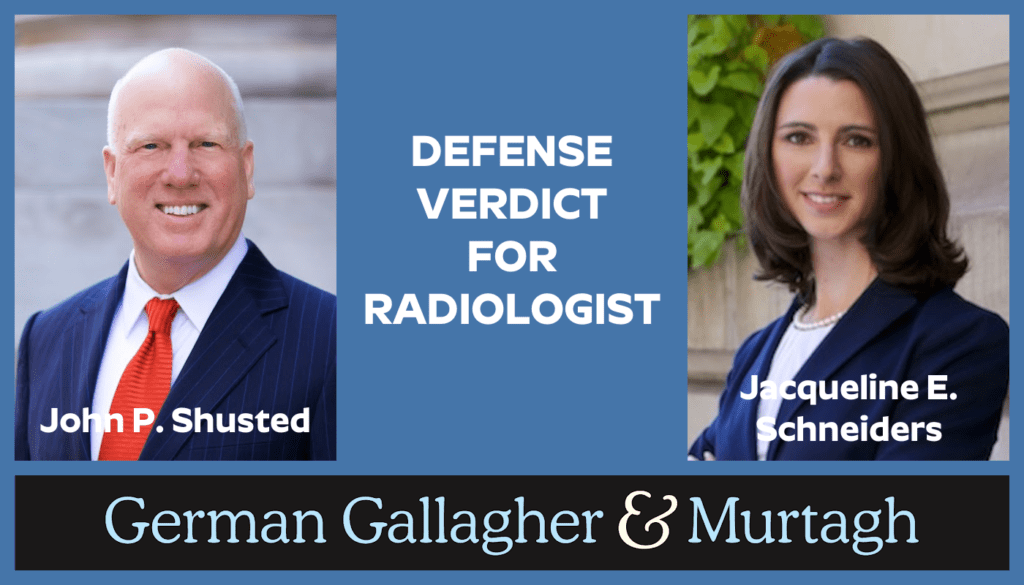
Newsroom
GGM is pleased to announce its newest Litigation Associate Tamarrin J. Johnson
 GGM is pleased to announce the addition of a new litigation associate, Tamarrin J. Johnson. At GGM Tamarrin will focus her practice on the defense of insured and self-insured entities in casualty and transportation matters. Before joining GGM, Tamarrin practiced in Philadelphia, Pennsylvania, concentrating on commercial and business litigation, including representing companies and entities in a broad range of civil matters in state and federal court.
GGM is pleased to announce the addition of a new litigation associate, Tamarrin J. Johnson. At GGM Tamarrin will focus her practice on the defense of insured and self-insured entities in casualty and transportation matters. Before joining GGM, Tamarrin practiced in Philadelphia, Pennsylvania, concentrating on commercial and business litigation, including representing companies and entities in a broad range of civil matters in state and federal court.
Tamarrin graduated from the Villanova University Charles Widger School of Law. While in law school, she served as Associate Editor of the Villanova Environmental Law Journal and as Chief of Staff for the National Black Law Students Associations.
Andre J. Webb Achieves Directed Verdict on Behalf of Client
Defense Win!
On October 20, 2022, Andre J. Webb secured a directed verdict on behalf of his client after a one-week trial in the Philadelphia County Court of Common Pleas.
The trial involved a motor vehicle accident where liability was contested, and the plaintiff alleged injuries to the neck, back, shoulder, and knee. Following the completion of the plaintiff and defendants’ case in chief, Mr. Webb argued that there was insufficient evidence presented for a trier of fact to place any liability for the accident on his client. The judge agreed and granted the Motion For A Directed Verdict.
Jeffrey Laudenbach Presented at the ALFAI 2022 Annual Business Meeting
Jeffrey Laudenbach presented at the ALFAI 2022 Annual Business Meeting on October 20, 2022 in Dublin, Ireland. The presentation was entitled “MEMBER FIRM TIPS – THERE IS NO RULE AGAINST PERPETUITY, SUCCESSION PLANNING FOR TOMORROW WITHIN ALFAI”. The panel presented strategies and discussed the advantages of involving and investing in the future leaders of ALFAI and the return it will have for your firm. This presentation was followed by a roundtable discussion on methods you can share with other ALFAI members on how to better strengthen their bench. For more information, please reach out Mr. Laudenbach at laudenbachj@ggmfirm.com.
Andre J. Webb served as Program-Chair of ALFA International’s 2022 Future Leaders Forum Seminar
Andre J. Webb served as Program-Chair of ALFA International’s 2022 Future Leaders Forum Seminar held at the Omni Hotel in Louisville September 21-22nd. Entitled “A Peek Behind the Curtain: See the Future of Our Legal Practice,” the conference featured ALFA International member firm attorneys and clients from a wide range of companies and corporations speaking on many topics with a forward-focused lens, homing in on areas such as the future of litigation, the future lawyer’s toolbox, how to keep future lawsuits from spinning out of control and preparing a client for a 30(b)(6) deposition. For more information, please reach out to Mr. Webb at webba@ggmfirm.com.
Matthew McColgan will present at the ALFA International’s 2022 Future Leaders Forum Seminar
Matthew McColgan will present at the ALFA International’s 2022 Future Leaders Forum Seminar on Thursday, September 22, 2022. The presentation is entitled “The Future Lawyer’s Toolbox,” the program will look at how we, as a practice, have utilized the recent technological developments to achieve success in defending and advocating for our clients. The program will also explore what the future generation of practitioners should aim to master to support their position at trial as plaintiff and defense tactics advance and evolve. For more information, please reach out Mr. McColgan at mccolganm@ggmfirm.com.
Matthew McColgan and Francis Bovio Successfully Obtained the Dismissal of a National Transportation Client Following a Motion to Dismiss in the Philadelphia County Court of Common Pleas
Highlighting a recent trend in federal courthouses that have applied the principle, Matthew and Francis argued that duplicative claims of an employer-defendant’s negligent entrustment, supervision, and training (“NEST claims”) should not stand for trial when the employer-defendant has admitted in responsive pleadings that the employee-defendant was acting within the course and scope of employment at the time of the alleged negligent conduct. The Court’s holding precludes an employer-defendant from appearing on a verdict sheet, leaving only the alleged negligence of the employee-defendant to be assessed by a fact finder. This outcome continues the development of the defense in commercial vehicle accident cases in an effort to manage inflammatory jury verdicts and minimizing the company’s potential exposure to duplicate and redundant claims.
PA Supreme Court Rescinds Medical Malpractice Venue Restriction Effective January 1, 2023
 On August 25, 2022, the Supreme Court of Pennsylvania, upon recommendation of the Civil Procedural Rules Committee, issued an Order amending the Pennsylvania Rules of Civil Procedure related to venue. Most significantly, the amendments remove the rule that required medical malpractice cases to be filed in a county where the cause of action arose. The Order also suspends the statutory venue provision in the MCARE Act. The committee’s Adoption Report contains a synopsis of its reasons for recommending an end to the venue limitation on medical malpractice cases.
On August 25, 2022, the Supreme Court of Pennsylvania, upon recommendation of the Civil Procedural Rules Committee, issued an Order amending the Pennsylvania Rules of Civil Procedure related to venue. Most significantly, the amendments remove the rule that required medical malpractice cases to be filed in a county where the cause of action arose. The Order also suspends the statutory venue provision in the MCARE Act. The committee’s Adoption Report contains a synopsis of its reasons for recommending an end to the venue limitation on medical malpractice cases.
Under the amended Rule 1006, an action against an individual may be brought “in a county where: (1) the individual may be served; (2) the cause of action arose; (3) a transaction or occurrence took place out of which the cause of action arose; (4) venue is authorized by law; or (5) the property or part of the property, which is the subject matter of the action, is located provided that equitable relief is sought with respect to the property.” As before, an action may be brought against all defendants in any county in which venue is proper as to any one defendant; the exception for medical malpractice cases was removed. The prior restriction for medical malpractice cases was similarly removed from the venue rules pertaining to partnerships (Rule 2130), unincorporated associations (Rule 2156), and corporations (Rule 2179).
The amended Rule 1006 maintains the provisions for transferring venue for the convenience of the parties and witnesses (Rule 1006(d)), and the requirement to raise improper venue by preliminary objection (Rule 1006(e)). New subsection (g) of the amended rule requires the Civil Procedural Rules Committee to reexamine the amendments two years after the effective date.
The amendments take effect January 1, 2023. A copy of the Order, amendments, and committee’s report can be found here. In light of the new rules, healthcare defendants should evaluate all complaints filed on or after January 1, 2023 to determine if venue should be challenged through preliminary objections and/or a motion to dismiss based on forum non conveniens.
Defense Verdict for Radiologist
On August 22, 2022, Jacqueline Schneiders and Jack Shusted obtained a defense verdict on behalf of their client, a radiologist, after a four-day trial in the Court of Common Pleas of Montgomery County in Norristown, Pennsylvania.
Plaintiff claimed that the radiologist failed to identify a fibula fracture on an x-ray and to recommend further imaging studies. Several weeks later, Plaintiff was found to have a displaced, comminuted fibula fracture. Post-surgery healing was delayed for several years due to nonunion.
Mrs. Schneiders and Mr. Shusted showed the jury how the radiologist met the standard of care in reading and reporting on the x-ray, and that there was no causal connection to the subsequent displaced fracture.
GGM Attorneys Recognized by The Best Lawyers in America for 2023
GGM is proud to announce that Yana N. Shapiro has been selected to The Best Lawyers in America, and Andre J. Webb has been named to The Best Lawyers in America: Ones to Watch.
The Best Lawyers in America recognizes the top four percent of practicing attorneys in the nation and is based on confidential client and peer evaluations, as well as extensive editorial research. Since it was first published in 1983, Best Lawyers has become universally regarded as the definitive guide to legal excellence. For more information, please visit https://www.bestlawyers.com.
NJ Appellate Division Determines that Employment Separation Agreement does not Constitute Payment for Disputed Workers’ Compensation Claim filed Outside Two Year Statute of Limitations
In the case of Donald Servais v. Ocean Wholesale Nursery, LLC., A-2988-20, (App. Div. July 14, 2022), the legal question presented was whether a Separation Agreement constituted a payment for a contested workers’ compensation case. In this matter, Petitioner alleged that he suffered an amputation of three fingers on his right hand while at work on January 26, 2016. Petitioner failed to file a workers’ compensation claim within the two-year statutory limitations period. Additionally, Respondent never paid Petitioner any temporary disability benefits as Respondent believed the injury happened while Petitioner was at home. Further, Respondent disputed the employee relationship with Petitioner as he was hired as a consultant rather than an employee. On October 26, 2018, Petitioner filed a formal claim petition. The claim was denied, and Respondent filed a motion to dismiss the claim petition. Petitioner argued that under a January 31, 2017 Employment Separation Agreement, Respondent paid Petitioner $5,000.00 to resolve their business relationship. Petitioner argued that at least part of this payment was for the loss of his fingers; therefore, the claim petition was timely filed from the date of separation agreement.
The issue was litigated and the Compensation Judge determined that Petitioner was in fact an employee and that Section 7 of the Separation Agreement was ambiguous. Despite there being no mention in the Agreement of Petitioner’s injury to his fingers, the Judge found that the Separation Agreement included any and all claims, including the loss of fingers, and apportioned $1,000.00 of the $5,000.00 paid under the separation agreement to the injury to the fingers. Therefore, a judgment was entered in favor of Petitioner. Respondent then appealed the decision. The Appellate Division ultimately reversed in favor of the Respondent. The Appellate Division determined that the language of the Agreement expressly excluded Petitioner’s workers’ compensation claim, stating:
“Paragraphs five and six of the Agreement would not reasonably lead a person to believe that the $5,000 payment under the Agreement was also a partial payment for his work-related injury because paragraph seven of the Agreement, clearly entitled in bold ‘Exceptions,’ expressly stated that the release in the Agreement did not ‘affect or limit’ his right to receive benefits for occupational injury under the Workers’ Compensation Law.”
The Appellate Division therefore held that Petitioner failed to file his claim petition in timely manner. It reversed the Order denying Respondent’s motion to dismiss and vacated the final judgment.


